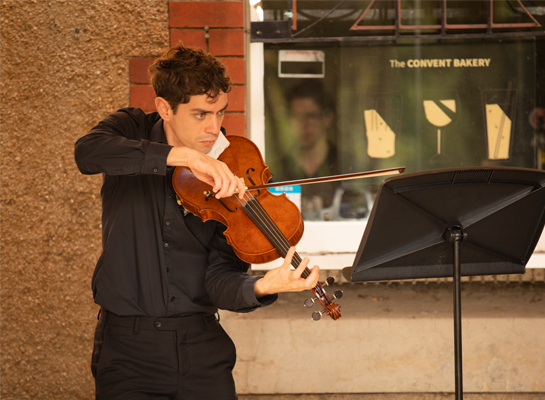Words by:
Philip Lambert
Music Librarian, ANAM Robet Salzer Foundation Library

In photo: Andrew Crothers (viola WA) credit to Pia Johnson
In 1722 Johann Sebastian Bach put the finishing touches to a collection of 48 pieces for keyboard, several of which had been composed during the preceding few years. He adorned it with an elaborate frontispiece which began:
The Well-tempered Clavier, or, Preludes and Fugues, through all the tones and semitones, both with respect to the major third or C D E (tertia major) and to the minor third or D E F (tertia minor). For the use and profit of musical youth wishing to learn, as well as for special passing of the time by those already skilled in this study….
Musical youth wishing to learn. Without knowing it, Bach gave a precise description of ANAM, so it is appropriate that we devote one of our Bach Diaries series to this particular work. The Well-Tempered Clavier is one of the great musical achievements of all time, and also a great leap forward in musical physics. For the first time, G-sharp minor and F-sharp major were demonstrated to be as playable as C major.
But what, precisely, did Bach mean by ‘well-tempered’? Experts are still debating. Up until the mid-twentieth century it was assumed that ‘well-tempered’ meant equally tempered, a compromise tuning which allows for every note in the chromatic scale to become the tonic of its own major or minor key. But early music professionals, aware that Bach experimented with many different tuning systems, now query that assumption. We will probably never know precisely what Bach meant. Acoustical considerations aside, The Well-Tempered Clavier remains the most dazzling set of keyboard pieces ever assembled, covering every style, mood and technique known at the time. Haydn, Mozart and Beethoven all knew it and drew from it.
And, as the term ‘clavier’ can refer to any keyboard, ANAM’s musicians will perform the set on harpsichord, piano and organ. Bach was known to play the 48 on his large variety of keyboard instruments, so why not follow his example?
This concert, incidentally, will not feature any spoken word due to its musical length. But the final Bach Diaries concert, which will feature the Goldberg Variations in Dmitry Sitkovetsky’s brilliant arrangement for string trio, will also include anecdotes from people who knew and loved Bach. They knew they had encountered someone extraordinary.
Book your tickets to the last Bach Diaries concerts, Science and Sleepless Night.